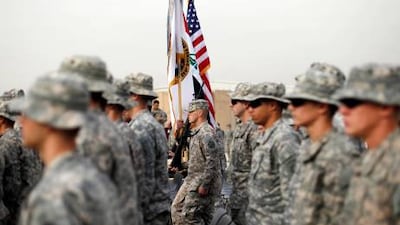BAGHDAD // After nearly nine years, more than 100,000 Iraqi deaths, 4,500 American fatalities and more than US$800 billion, US officials formally shut down the war in Iraq yesterday.
US Defence Secretary Leon Panetta said it was worth the price in blood and money because it set Iraq on a path to democracy.
Mr Panetta stepped off his military plane in Baghdad yesterday as the leader of America's war in Iraq, but will leave as one of many top US and global officials who hope to work with the struggling nation as it tries to find its place in the Middle East and the broader world.
More than 100,000 Iraqis have been killed since the US invasion in 2003, according to the Iraq Body Count website. Bombings and gun battles are still common. And experts are concerned about the Iraqi security force's ability to defend the nation against foreign threats.
Mr Panetta and several other US diplomatic, military and defence leaders participated yesterday in a ceremony during which the flag of US Forces-Iraq was retired, or "cased," according to Army tradition. The US Forces-Iraq flag was wrapped around a flagpole and covered in camouflage. It will be brought back to the United States.
"You will leave with great pride - lasting pride," Mr Panetta told the troops. "Secure in knowing that your sacrifice has helped the Iraqi people to begin a new chapter in history."
But the atmosphere in Baghdad yesterday was a strange and uneasy mixture of victory and defeat, optimism and pessimism.
Some were triumphantly boasting of vanquishing a despised enemy. Others worried about a crucial safety net being ripped away.
"This is an historic day of victory over the Americans and it is a proud day for us all," said Khalid Al Jeyashi, a Sadrist MP. The Sadr movement has fought both militarily and politically against the US presence, a stance that won it widespread grassroots support among the country's Shiite majority.
"The departure of the US generals is a true victory for Iraq, and it justifies the sacrifices we have made fighting them and forcing them to leave," Mr Al Jeyashi said.
The Sadrists have warned that the conflict will resume if US forces do not fully pull out, or if the US embassy appears to be more of a military outpost than a diplomatic office.
The prospect of such renewed violence alarms many and it is for that reason that a sizeable number of Iraqis, particularly among the intellectual and liberal classes, have dreaded yesterday's ceremony.
"Withdrawl of foreign troops is a good thing, but this is too soon, a couple of years to soon for us," said Ibrahim Al Gharawi, a retired politics professor who taught at Baghdad's Mustansariya University.
He reeled off a list of problems Iraq still faces, now without being able to fall back so easily on the US military expertise that has been working behind the scenes even after combat operations formally stopped last year.
"Security is still fragile. There are sectarian militias, Al Qaeda, corruption, the political elite are trying to monopolise power," he said.
Outside the capital, there was a similar mixture, with people describing competing emotions. In Fallujah, a centre of anti-American resistance in the Sunni heartlands, lawyer Meshaan Al Baghdadi accused the US of war crimes and talked of yesterday as "victory for us, an American defeat".
In the next breath however he made clear his fear that, with the Americans leaving, Tehran would be taking complete control.
"It will take the Iranians two years at the most to take hold of Iraq entirely," he said. "The Americans have been defeated but maybe the Iraqis have too."
Amid the hopes of a better future without the US army deployed across Iraqi territory, the worry does run deep, with some Iraqis speaking of instinctively fearing the worst.
On Wednesday, a student in his mid-20s was on the bus traveling into the capital when, at the southern gate to the city, he saw four corpses stretched out by the side of the road.
"It was just like being back in 2007, in the worst days of the war," he said. "I hadn't seen that kind of thing for a while and it suddenly made me think that we have not come very far from that and maybe we can still fall back into the killing again."
Mr Panetta echoed President Barack Obama's promise that the US plans to keep a robust diplomatic presence in Iraq, foster a deep and lasting relationship with the nation and maintain a strong military force in the region.
As of yesterday, there were two US bases and about 4,000 US troops in Iraq - a dramatic drop from the roughly 500 military installations and as many as 170,000 troops during the surge ordered by President George W Bush in 2007, when violence and raging sectarianism gripped the country. All US troops are slated to be out of Iraq by the end of the year, but officials are likely to meet that goal a bit before then.
Still, despite Mr Obama's earlier contention that all American troops would be home for Christmas, at least 4,000 forces will remain in Kuwait for some months. The troops will be able to help finalise the move out of Iraq, but could also be used as a quick reaction force if needed.
Over the coming days, the final few thousand US troops will leave Iraq in orderly caravans and tightly scheduled flights - a marked contrast to the shock and awe that rocked the country on March 20, 2003, as the US invasion began.
Saddam Hussein has been ousted, the reports of weapons of mass destruction largely laid to rest. And the future of a nascent democracy awaits.
*additional reporting by the Associated Press

